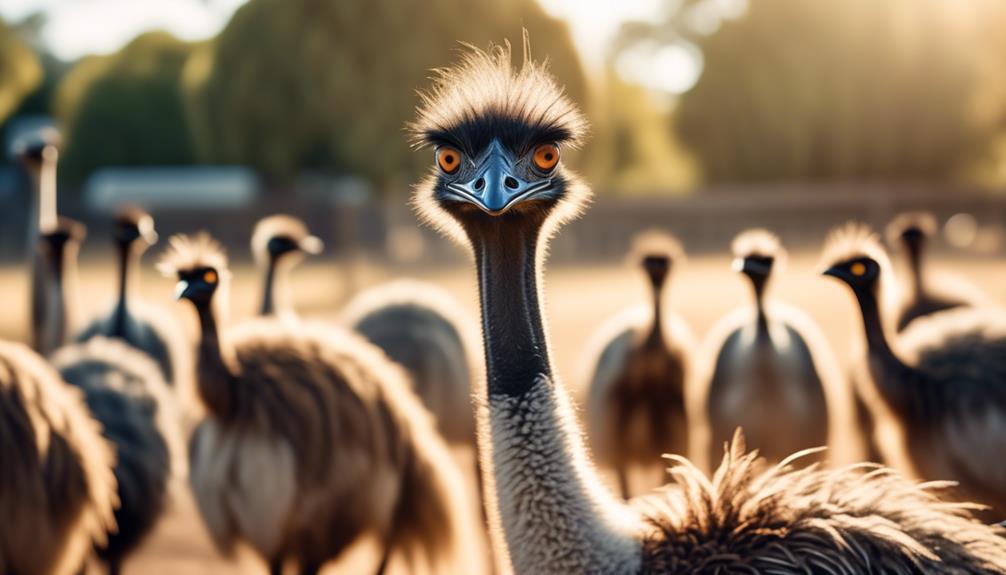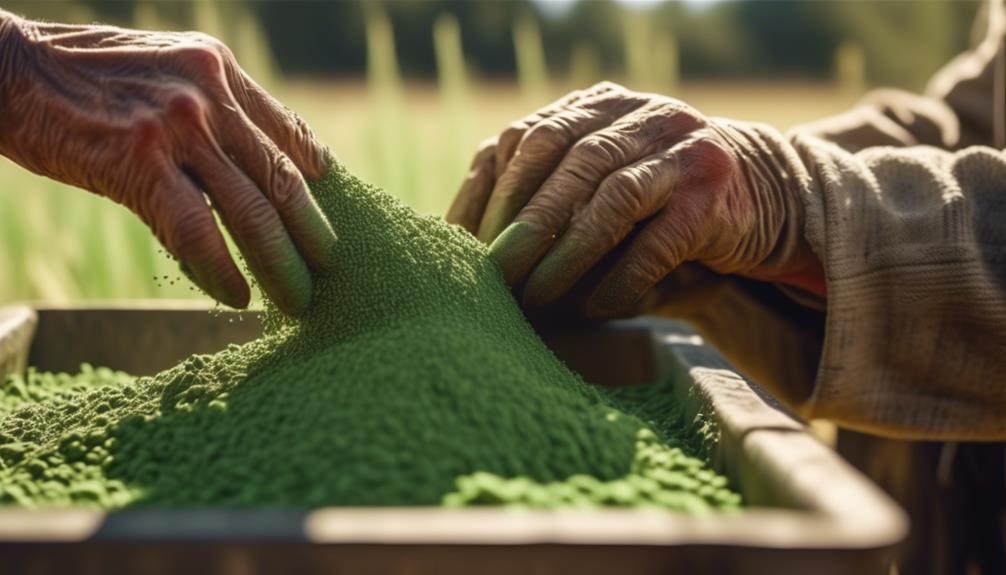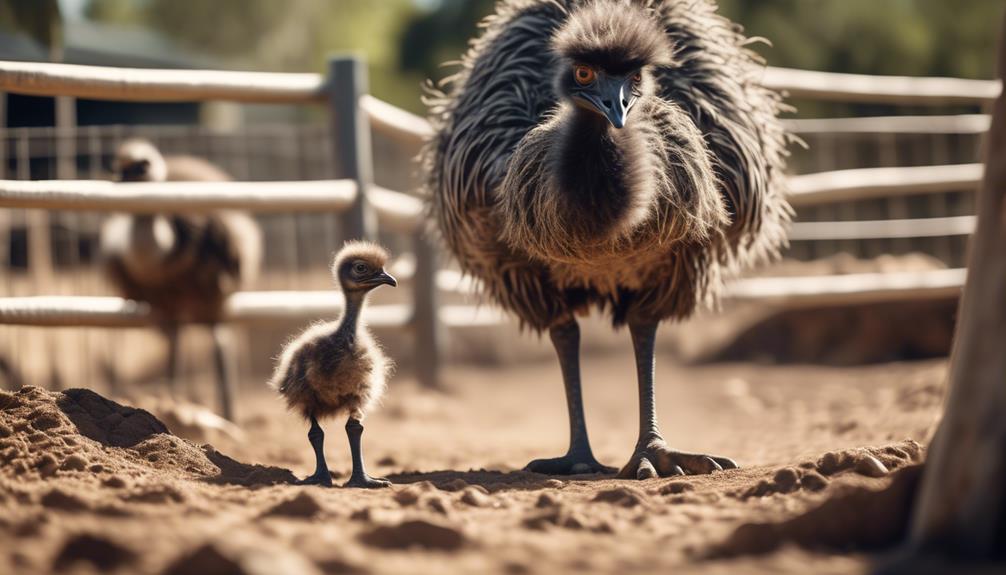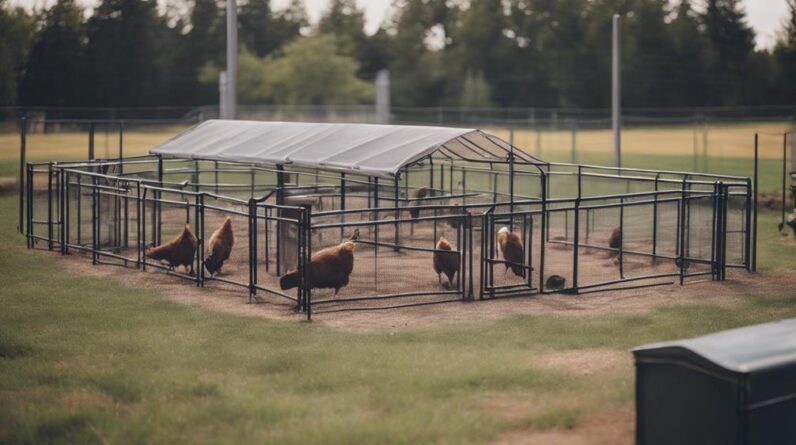
Did you know that the emu farming industry has experienced a steady growth of 20% per year over the past decade? With such promising numbers, it's no wonder that more and more farmers are looking to get involved in the art of raising emus.
But what does it take to succeed in this unique endeavor? In this discussion, we will explore the insights and wisdom shared by experienced farmers who have mastered the art of raising emus.
From choosing the right emu breeds to marketing and selling emu products, there is much to learn and discover. So get ready to embark on a fascinating journey into the world of emu farming and gain valuable insights that will help you thrive in this industry.
Choosing the Right Emu Breeds

When it comes to selecting the appropriate emu breeds for your farm, it's crucial to consider various factors such as temperament, adaptability to local climate, and desired end products.
Emu breed characteristics play a significant role in determining the success of your farming venture. Each breed has its own unique traits that can greatly impact the overall productivity and profitability of your farm.
One important factor to consider is the temperament of the emu breed. Some breeds are known to be more docile and friendly, making them easier to handle and manage. On the other hand, there are breeds that can be more aggressive and territorial, requiring extra caution and experience in handling them.
Adaptability to the local climate is another key consideration. Emus are naturally resilient birds, but certain breeds may have specific climate preferences. Some breeds are better suited for colder climates, while others thrive in warmer regions. Assessing the climate conditions of your farm and selecting an emu breed that can adapt well to those conditions will ensure the birds' overall health and well-being.
Additionally, the desired end products of your farm should guide your breed selection. Emus are raised for various purposes, including meat, feathers, and oil. Different breeds may have varying qualities of meat, feathers, or oil production. Understanding your market demands and selecting a breed that aligns with those demands will maximize your farm's profitability.
Creating the Ideal Emu Habitat
To create the ideal habitat for emus on your farm, it's essential to consider their natural instincts and provide them with a suitable environment that meets their needs for shelter, space, and safety. Designing emu enclosures and managing their habitat is crucial for their overall well-being.
Here are some key points to consider:
- Shelter:
- Emus need a sturdy and predator-proof shelter to protect them from extreme weather conditions and potential threats. Consider building a secure enclosure with solid fencing and a roof to provide shade and shelter.
- Emus prefer open spaces, so make sure to provide them with enough room to move around comfortably. A spacious enclosure allows them to stretch their legs and exhibit their natural behaviors.
- Space:
- Emus are naturally curious and active birds, so it's important to provide them with ample space to roam and explore. Aim for at least 2500 square feet per pair of emus to ensure they have enough room to thrive.
- Create separate areas within the enclosure for feeding, nesting, and dust bathing. This will allow emus to engage in their natural behaviors and maintain a healthy lifestyle.
Feeding and Nutrition for Healthy Emus

Now that you have created the ideal habitat for your emus, it's important to understand the importance of feeding and nutrition to ensure their overall health and well-being. Emus have specific dietary requirements that must be met in order for them to thrive. Providing them with a balanced diet is crucial for their growth, development, and overall immune system.
The diet of emus primarily consists of a combination of grains, fruits, vegetables, and protein sources. Their main source of energy comes from grains such as corn, oats, and barley. Fruits and vegetables, such as apples, carrots, and leafy greens, provide essential vitamins and minerals. Additionally, emus need a good source of protein, which can be provided through insects, worms, and even small rodents.
When it comes to feeding emus, it's important to establish a consistent feeding schedule. Emus should be fed twice a day, once in the morning and once in the evening. This regular feeding routine ensures that they're receiving the necessary nutrients and prevents overeating. It's also important to provide fresh, clean water at all times.
Maintaining Emu Health and Preventing Diseases
Maintaining emu health and preventing diseases is a crucial aspect of responsible emu farming. As a diligent emu farmer, you understand the importance of implementing effective biosecurity measures and vaccination protocols.
Here are a couple of key points to consider:
- Emu Biosecurity Measures
- Quarantine: Introduce new emus to your flock only after they've undergone a quarantine period to minimize the risk of introducing diseases.
- Sanitation: Regularly clean and disinfect the emu pens, feeders, and waterers to prevent the spread of pathogens.
- Emu Vaccination Protocols
- Consult a veterinarian: Seek guidance from a knowledgeable veterinarian to develop a comprehensive vaccination program tailored to your emus' specific needs.
- Follow the schedule: Adhere to the recommended vaccination schedule to ensure your emus are protected against common diseases.
Emu Reproduction and Breeding Practices

As an experienced emu farmer, you understand the significance of ensuring the health of your flock. Now it's time to explore the essential aspects of emu reproduction and breeding practices.
Emu genetics play a crucial role in maintaining the quality and traits of your emu population. Selecting breeding pairs with desirable characteristics is key to producing healthy and thriving emus. It's important to consider traits such as size, feather color, and temperament when choosing breeding birds.
Emu mating behavior is also an important aspect to understand. Emus are polygamous birds, with males often mating with multiple females during the breeding season. The male emu builds a nest and attracts females by making a deep drumming sound.
Once the female emu lays her eggs, the male takes on the responsibility of incubating them for around 52 days. This unique behavior allows for efficient reproduction within your flock.
Emu Egg Incubation and Hatching Techniques
To ensure successful emu egg incubation and hatching, it's crucial to follow proper techniques and provide the necessary conditions for optimal development. Emu egg care requires attention to detail and a nurturing approach, as these eggs are delicate and sensitive to their environment.
Here are some important techniques to consider:
- Maintain proper temperature and humidity levels:
Emu eggs require a constant temperature of around 97 to 101 degrees Fahrenheit and a humidity level of approximately 30 to 40 percent. Use a reliable incubator with accurate temperature and humidity controls to ensure consistent conditions.
- Regularly rotate the eggs:
Emu eggs need to be gently turned at least three times a day to prevent the embryo from sticking to the shell. This mimics the natural behavior of the emu, where the eggs are constantly shifted by the parent.
Emu chick development is a remarkable process that requires careful monitoring and patience. From the 52 to 54-day incubation period, the emu chick slowly develops inside the egg, forming its beak, feathers, and limbs. As the hatching day approaches, you may notice the chick moving and pecking at the shell. It's essential to resist the temptation to assist the chick during this critical stage, as it needs to complete the hatching process on its own to strengthen its muscles and respiratory system.
Emu Handling and Training Tips

Proper handling and training techniques are essential when it comes to emus, ensuring their well-being and cooperation in various activities. Emu behavior modification and socialization techniques are crucial for creating a harmonious relationship with these unique creatures. Here are some practical tips to help you handle and train emus effectively:
- Approach with Calmness: Emus are highly perceptive animals, so it's important to approach them calmly and confidently. Sudden movements or loud noises can startle them, leading to unpredictable behavior.
- Positive Reinforcement: Emus respond well to positive reinforcement. Reward desired behavior with treats or praise to encourage them to repeat it. This can be especially effective in teaching them basic commands or tricks.
- Consistency and Patience: Emus are intelligent animals, but they may take time to learn and adjust to new commands or routines. Be patient and consistent in your training methods, providing clear and repetitive cues.
- Emu Socialization: Exposing emus to different people, animals, and environments from a young age can help them become more social and adaptable. Regular interaction with humans and other animals will contribute to their overall well-being.
| Emu Handling Tips | Emu Training Tips |
|---|---|
| Approach calmly and confidently | Use positive reinforcement |
| Be patient and consistent | Expose emus to different stimuli |
| Avoid sudden movements and loud noises | Provide clear and repetitive cues |
Marketing and Selling Emu Products
Marketing and selling emu products requires a strategic approach to reach potential customers and showcase the unique qualities of these sought-after items. To effectively market and sell emu products, you need to focus on two key aspects: emu product distribution and emu product branding.
Emu Product Distribution
- Online platforms: Utilize e-commerce platforms, such as your own website or popular marketplaces, to reach a wider audience and make your emu products easily accessible.
- Local markets and fairs: Participate in local markets and fairs to connect directly with potential customers and allow them to experience your products firsthand.
Emu Product Branding
- Storytelling: Share the story behind your emu products, highlighting their natural and sustainable qualities. Emphasize how your farming practices contribute to the high quality of the products.
- Product differentiation: Highlight the unique features of your emu products, such as their health benefits or versatility in culinary applications. Stand out from the competition by offering something special.
Frequently Asked Questions
What Are the Legal Requirements for Raising Emus in My Area?
To legally raise emus in your area, you'll need to be aware of any legal restrictions and obtain the necessary permits and licenses. It's important to research and understand the specific requirements in your jurisdiction.
How Much Space Do Emus Require in Their Habitat?
Emus require a substantial amount of space in their habitat, with experts recommending at least 1/4 to 1/2 an acre per bird. Designing an enclosure that mimics their natural environment is crucial for their well-being.
What Is the Average Lifespan of an Emu?
The average lifespan of an emu is around 10-20 years in the wild. These flightless birds have unique breeding habits, with males incubating the eggs and caring for the chicks.
Can Emus Be Kept With Other Animals, Such as Chickens or Goats?
Keeping emus with other animals like chickens or goats has its challenges. Compatibility depends on the individual animals and their temperaments. Benefits can include companionship and pest control, but drawbacks may include aggression or competition for resources.
What Are Some Common Challenges and Difficulties in Raising Emus?
Raising emus can present a set of challenges. From meeting their specific diet requirements to breeding difficulties, it takes knowledge and dedication. The Art of Raising Emus: Insights From Experienced Farmers provides valuable guidance on these issues.
Conclusion
Congratulations! You've now mastered the art of raising emus, thanks to these experienced farmers. From choosing the right emu breeds to creating the perfect habitat, feeding them nutritious meals, and maintaining their health, you're well-equipped to handle all aspects of emu farming.
With these tips on breeding, incubation, handling, and training, you'll be a pro in no time. And don't forget to market and sell those emu products for maximum profit.
Emu farming, the feathered adventure you never knew you needed!





